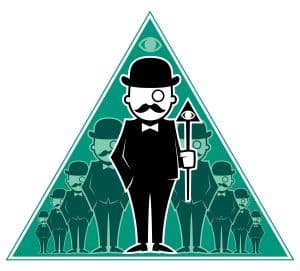Facts About the Secret Societies
Throughout history, secret societies have existed below the surface of public awareness, shaping our world differently. It often evokes a sense of mystery and curiosity, especially among college-bound students who are about to step into a realm of higher education filled with traditions. This blog aims to unfold the veils shrouding secret societies, exploring their historical significance, influence on modern academia, and their subtle yet intriguing presence on college campuses across the globe.
Historical Intrigue
The realm of higher education has a long-standing relationship with various exclusive organizations that date back to the early days of university systems. Historically, these organizations offered scholars, thinkers, and other influencers a secure space for intellectual conversations away from public scrutiny.
The Knights Templar serves as a prime example. This medieval Christian military order expanded its influence beyond battlefields into medieval European economics. Their vast networks and financial skills not only ensured the safety of pilgrims traveling to the Holy Land but also laid the groundwork for contemporary banking systems.
As hubs for innovation, these organizations generated groundbreaking ideas and discoveries. Members often challenged traditional thinking, driving academic and societal progress. The atmosphere of confidentiality that surrounded them stimulated further intellectual curiosity.
The story doesn’t stop with the Knights Templar. Consider the Rosicrucians, an enigmatic group originating in the early 17th century. They claimed to have specialized knowledge, offering deep insights into nature and the cosmos. Their philosophical works continue to influence Western metaphysical studies today.
Furthermore, you’ll find recognizable groups like the Freemasons boasting a diverse range of scholars and thinkers. Their meeting places provided forums for ethical and intellectual discussions, often breaking down societal barriers. The Freemasons’ ideology and practices continue to captivate both scholars and the general public to this day.
In American higher education, elite institutions such as Yale and Harvard host their own exclusive groups, like Skull and Bones and the Porcellian Club. These groups, steeped in tradition and mystery, remain an integral part of college lore and offer a unique sense of community among their members.
Moreover, the influence of these organizations extends beyond the confines of their meeting rooms. They impact the academic and social environment of the institutions with which they’re associated. Their mystique keeps capturing the imagination of students and scholars alike, serving as a testament to their enduring legacy.
In conclusion, the role of such organizations remains an exciting chapter in the history of intellectual and academic pursuits. As you embark on your academic journey, understanding their impact may offer you unique perspectives on the pursuit of knowledge and the unknown.
A Glimpse into Renowned Secret Societies
History is rich with tales of mysterious organizations that have long fascinated people. This article will help you explore some of the most famous organizations that have made a significant impact on historical and current events.
1. The Freemasons
The Freemasons rank among the oldest organizations of this kind. Historians trace their origins back to medieval guilds of stonemasons and craftsmen. Over the years, they transformed from a trade union into a more mystical fraternity, famous for elaborate rituals and symbolism. They operate on ethical principles, evident in their teachings, advocating personal growth, charity, and community service. Despite the openness of many of their activities, speculation about their influence on social and political movements still exists. Most people consider them not as a secretive organization but as an organization that keeps certain secrets.
2. Knights Templar
Founded in the 12th century, the Knights Templar became renowned during the Crusades for protecting Christian pilgrims traveling to the Holy Land. They accumulated wealth and influence, sparking rumors of hidden treasures and secret knowledge. Although accused of heresy and disbanded by royal decree, their influence persists in various forms of modern culture, such as novels, films, and conspiracy theories.
3. The Illuminati
Contrary to popular belief, the original Illuminati started in Bavaria in 1776 as a group of intellectuals opposing religious control over public life. Despite its dissolution less than a decade later, the term “Illuminati” still fuels various conspiracy theories involving global manipulation. While many claims about their world-controlling ambitions lack evidence, the fascination with the group endures.
4. Skull and Bones
Located within Yale University, the Skull and Bones organization was formed in 1832. The society selects its members from society’s elite and includes influential individuals like business leaders and U.S. Presidents. Its mysterious rituals have led to much speculation. While it’s hard to gauge their real influence, many believe they wield significant power in American politics and business circles.
5. The Oracle at Delphi
Though not a secretive organization in the modern sense, the Oracle at Delphi held a significant role in ancient Greek society. As the spokesperson for the god Apollo, leaders and citizens consulted the Oracle for divine advice. The Oracle’s influence touched many aspects of ancient Greek culture, from politics to warfare.
The Lasting Fascination: What Draws Us In?
As you delve into these organizations, you’ll find a mix of facts and myths that have shaped human history and behavior. The allure lies not only in their hidden activities but also in their power to engage our fascination with the unknown. Each contributes to the broader narrative of how such organizations have influenced our world.
By understanding these organizations, you gain a more nuanced view of history and an appreciation for the human desire for mystery and power.
Modern-Day Collegiate Secret Societies
When you delve into the world of higher education, particularly in prestigious institutions, you might encounter unique organizations that combine tradition with secrecy. These organizations offer select members a journey filled with camaraderie, leadership, and intellectual growth.
Tradition and Mystique
Central to the allure of these organizations lies their secretiveness. Their private meetings and selective recruitment processes underscore the essence of mystery. Such groups often have a rich history, serving as a bridge between the past and the present. They foster a sense of community among members through rituals steeped in symbolism.
Cultivating Leadership Skills
These campus groups go beyond mere exclusivity. They serve as platforms for developing leadership and promoting academic success. Within these structured environments, members hold each other accountable and commit to excellence. This accountability prompts them to question prevailing norms, engage in meaningful conversations, and take on leadership roles both within and outside the educational setting.
Social Responsibility
Besides fostering personal and professional development, many of these organizations prioritize positive societal impact. Their activities often include community outreach and fundraising initiatives for worthy causes. This underscores their commitment to social responsibility.
The Network Beyond Graduation
The sense of community often extends beyond your college years, evolving into lifelong friendships. Prominent examples include Yale’s Skull and Bones, which has a powerful network of alumni who have excelled in various fields such as politics, business, and law. Shared experiences and common goals strengthen this network, which continues to flourish long after graduation.
The Broad Influence
As you step into the realm of higher education, you might find these groups inviting you to participate. They offer a unique pathway for personal growth and social engagement, enriching the overall college experience. Their influence on both individual members and the larger academic community attests to their enduring relevance in today’s educational landscape.
Facts About the Secret Societies Unveiled
The world of secret organizations has long captivated historians, writers, and the public. These groups offer a complex and rich history that reaches into various aspects of human life, from politics to philanthropy. Here, you’ll learn about their origins, their notable members, their philanthropic activities, their presence in academia, and their unique rituals.
The Roots and Historical Impact
Discussing these enigmatic groups starts with understanding their origins. Take the Knights Templar, for example. Founded in the 12th century, this religious military order first aimed to protect Christian pilgrims on their way to the Holy Land. Over time, the group amassed considerable wealth and political power. They established financial systems, acquired vast land, and even played roles in the selection of kings. The Pope disbanded them in 1312, but the legend of their hidden treasures and influence continues.
The Illuminati offers another interesting case. Founded in 1776, this group aimed to advance Enlightenment ideals and oppose the church and monarchy’s oppressive rule. Authorities dissolved the Bavarian group in 1785, but the term ‘Illuminati’ has since referred to various groups with similar claimed objectives, although concrete evidence remains scarce.
Who Belongs: Influential Members and Their Roles
One of the most intriguing facets of these organizations involves their membership lists. Figures like George Washington, who was a Freemason, and Winston Churchill, a member of the Order of the Garter, give credence to the idea that these organizations wield significant influence. You might find it interesting that Freemasonry has had several U.S. Presidents, such as Theodore Roosevelt and Harry Truman, and influential thinkers like Voltaire and Mozart are past members.
Do these memberships influence global events? It’s a complex question, but the presence of powerful individuals in these organizations certainly sparks interesting conversations.
Acts of Charity: More Than Just Secrets
Contrary to popular belief, not all such organizations aim for world dominance or engage in nefarious activities. Many commit to charitable work. Take the Independent Order of Odd Fellows, founded in the 18th century. This organization focuses on goodwill, charitable deeds, and community service. Some Masonic lodges also invest in charitable activities, from hospital funding to scholarship offers. This philanthropic side often goes unnoticed but constitutes a significant part of many organizations’ legacies.
Academic Connections: More Than Ivy League Mysteries
These organizations have also found their way into academia, particularly at American universities like Yale, Harvard, and Princeton. Consider Yale’s Skull and Bones. Established in 1832, this society has helped shape future leaders, including presidents and Supreme Court justices. Membership often comes with a network that can prove invaluable later in life. These societies also frequently emphasize academic excellence.
Rituals and Codes: A Sense of Belonging
You might find it captivating that these organizations often adhere to unique rituals. These practices bind members together, promoting exclusivity and continuity. For example, Freemasons use specific handshakes, signs, and code words to identify one another. While these may seem mysterious, they are integral to the organization’s identity and cohesion.
Concluding Thoughts
As you can see, the subject of secret organizations offers a rich field of study. Their impact ranges from philanthropic activities to shaping historical events, and their memberships include both powerful individuals and academic elites. Whether you view them with skepticism or intrigue, these groups undeniably continue to impact various aspects of human civilization. This area of study can provide invaluable insights for students interested in social traditions, governance, and leadership.
The Role of Societal Groups in Your Transition from High School to College
Moving from high school to college marks a significant milestone in your academic journey. This new phase brings with it a sense of independence and a different social landscape, which can sometimes feel overwhelming. Secret societies, including those shrouded in mystery and exclusivity, offer a unique way to foster a sense of belonging during this pivotal time.
Finding Your Support System
Joining a close-knit group can comfort you amid the plethora of new experiences college has to offer. Such groups often share rituals, values, and a common mission. This sense of unity can help alleviate any feelings of alienation you might experience as you navigate the challenges of college life.
Tradition and Belonging
Many of these secret societies have traditions passed down through generations. If you’re a freshman, joining one can serve as a form of initiation, smoothing your emotional and social adjustment to college life. It offers you a chance to connect with something larger, anchored in rich history and traditions.
Networking and Future Opportunities
Being part of such a community isn’t just about immediate camaraderie; it also offers long-term benefits. This community can connect you with like-minded individuals, alumni, and even professionals in your field of interest. These connections can serve as stepping stones for your future career.
A Diverse College Experience
It’s crucial to explore different facets of college life for a well-rounded education. While exclusive groups have their allure, actively engaging in various extracurricular activities and building a diverse network remains essential.
Consider the Drawbacks
Exclusivity can also be a double-edged sword. The secretive nature and selective admission processes of some groups might create feelings of exclusion or elitism, contradicting the inclusive ethos many colleges work hard to maintain.
While societal groups can add value to your college life, embracing a balanced and inclusive approach remains vital for a fulfilling experience. With this balanced outlook, you can weave your way through the intricate social fabric of college, maximizing the opportunities that arise.
Conclusion
These facts about secret societies reveal a fascinating intersection of history, academia, and social engagement. As college-bound students step into a new chapter of academic exploration and personal growth, the narrative of secret societies enriches the broader discussion surrounding college admissions and campus life. Through understanding the legacy and the ethos of these enigmatic societies, students can better appreciate the tapestry of traditions and experiences that form the essence of college camaraderie and intellectual discovery.









































